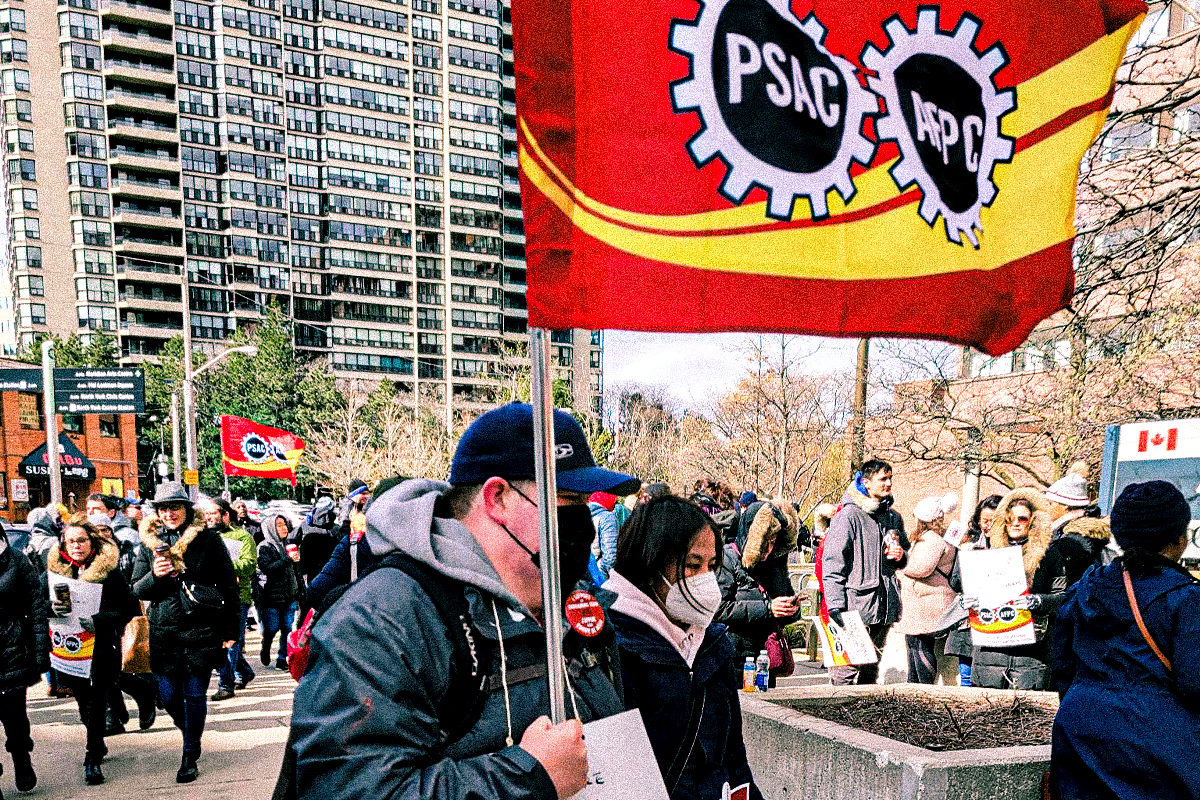
Over 155,000 federal government workers organized with the Public Service Alliance of Canada (PSAC) are leading one of the largest strikes in Canadian history, after years of real wage cuts and fruitless negotiations.
Picket lines are up, in front of federal buildings across the country, at more than 250 sites and affecting roughly 28 departments and agencies—from the Canada Revenue Agency (CRA) to Passports. Speaking to Fightback on the picket lines in Toronto, the workers expressed a firm readiness to fight to win.
‘I’ve had to cut back’
“I’ve been with the federal government for the past seven years,” said Will, a CRA employee, who agreed to speak on condition of anonymity. “The last contract we had for our component was in 2020, right as the pandemic started. We were on the edge of a strike, then. But, while we were able to get a contract, that’s the only one I’ve seen. One contract for seven years.”
“Functionally, I am making less money than when I started,” Will said. “It has especially hurt at the grocery store where prices have been insane.”
“It’s been very very tight. It’s getting to the point where it’s hard to manage my rent and my groceries at the same time—it’s been difficult since I’ve started and I’ve never received a raise since,” Stanley, an Immigration and Refugee Board worker said. “Every department is suffering.”
“I went through the whole COVID situation and it was all hands on deck. But while you do more work, you don’t see any increase in wages,” Dillon said. “I’ve had to cut back.”
Asked about management’s push to force workers back into the office, Dillon noted, “ My office is in Gatineau. It’s a huge commute. Some of our members want to see their families. “
“I work from a call centre,” said James. “I can work from home and do what I need to do without needing to pay to get in the office, that’s extra costs for gas, daycare, transit, for work I know I can do at home as efficiently, but you also don’t want to increase my pay to help me out.”
“It’s insane, I’m moving out of Toronto to New Brunswick soon just to afford the basics, but inflation is everywhere,” said Jeremy, a CRA employee. “We can’t escape it, this system is failing everywhere.”
‘The line doesn’t end’
Years of cuts, the workers noted, has translated into a massive picket line, surrounding the Joseph Shephard Building in North York.
“This is my first time seeing everyone in person,” James said. “Take a look around, individually we may not have a lot that we can do but we came together. We can put the powers that be in place.”
“The government says they care about us and they want to help us, but they want more out of our pockets, more work out of our day, without more pay,” he said.
Moreover, he noted, the government does the same to other workers across the country.
“The government always wants us to jump through more hoops to get basic things but if you’re a big guy, they’ll help you out. It’s like how we all struggle to buy groceries, but Loblaws is getting bailed out.”
“Working in the CRA allows me to see how the government treats people and big corporations differently,” said Jeremy. “Ordinary workers and small businesses are ordered to get the hard end of the stick, while little to no resources are spent going after big companies.”
When asked what he and his coworkers try to do in this scenario Jeremy responded, “We try to do everything we can to fairly accept the applications of small businesses and ordinary workers, because unlike the government, we actually care about the hardship they’re going through.”
Escalate the struggle
The current strike is the union’s largest since 1991, against the Mulroney Progressive Conservatives. At the time, the PCs offered the union wage freezes during the first year, followed by three per cent in the two years following—amounting to another real cut.
Much like the Trudeau Liberals, the PCs quickly showed their willingness to use back to work legislation. Since that strike ended—when PSAC called on its members to observe the terms of Mulroney’s legislation—their wages have been eroded while their workloads increased. This is the price of weakness.
When asked by a journalist “How aggressive are we talking? I’m not expecting something like 1991 on Wednesday,” PSAC president Chris Aylward answered: “No, because what you’ll see on Wednesday if this occurs, if this government forces a strike, will be much bigger than 1991.”
Already, the strike has forced Trudeau’s Treasury Board Minister into apparent hiding. The strike has capably organized massive picket lines, aided by supporters from other unions and working class communities. These efforts must be extended.
“If the strike puts real pressure on the government and if they make one false move—that could be the end of this current regime,” Dillon said. “And, I think that’s kinda cool.”
The recent strike by 55,000 CUPE education workers against the Ford government forced it to withdraw its attack on their right to strike. The whole labour movement must mobilize in support of the PSAC membership further—defying any and all laws that attack the right to strike.
Victory to PSAC!
Picket lines mean do not cross!
Strike to win!

